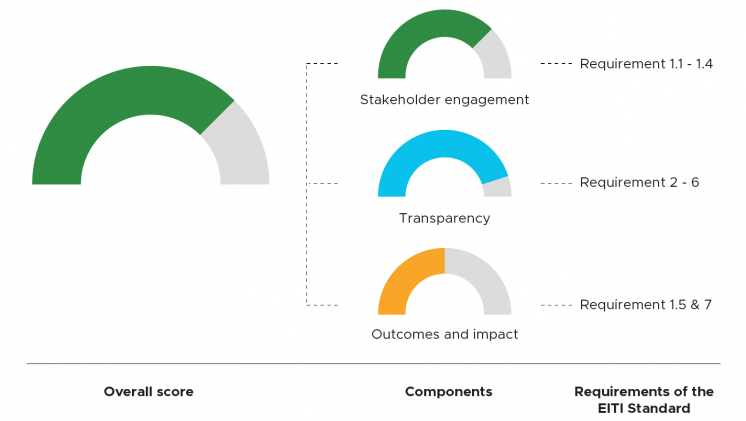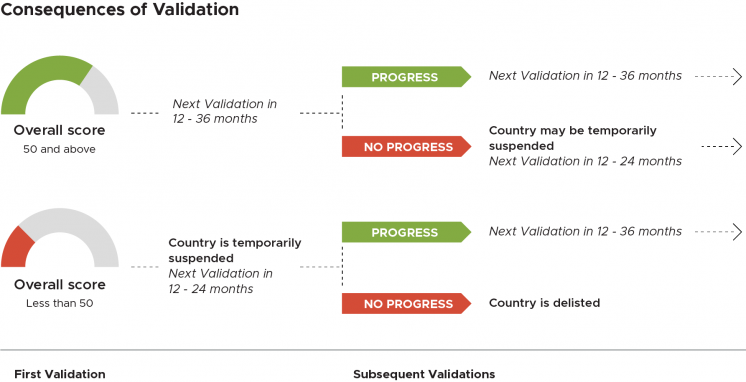
Validation
Assessing progress in meeting the EITI Standard
The EITI holds all implementing countries to the same global standard. Through Validation, the EITI’s quality assurance mechanism, implementing countries are assessed on their ability to meet the provisions of the EITI Standard.
Validation promotes dialogue and learning at a country level, providing countries with an opportunity to communicate progress and to identify and address challenges in EITI implementation. It captures stakeholder views and allows countries to highlight their perspectives on the effectiveness and sustainability of EITI implementation. It acknowledges that countries have different starting points and face diverse challenges in implementing the EITI, and that they will use the EITI to address their most pressing priorities for improving extractives governance.
How Validation works
Components
Countries undergoing Validation receive a score based on the assessment of three components.
-
Stakeholder engagement: This component assesses EITI Requirements 1.1 to 1.4, namely the participation of constituencies and multi-stakeholder oversight throughout the EITI process.
-
Transparency: This component assesses EITI Requirements 2 to 6, namely whether the country meets the disclosure requirements of the EITI Standard.
-
Outcomes and impact: This component assesses EITI Requirements 7 and 1.5, namely on progress in addressing national priorities and public debate.
Outcomes
The three components of EITI Validation – “Transparency”, “Stakeholder engagement” and “Outcomes and impact” – each receive a score out of 100. The overall score represents an average of the component scores.


Each component corresponds to a subset of requirements in the EITI Standard. Validation assesses the extent to which each EITI Requirement is met, using five categories. The component score is an average of the points awarded to each requirement that falls within the component.

Consequences of Validation
The Validation model sets minimum levels of progress for Validation scores which, if not achieved, will trigger suspension or delisting.
If a country has "partly met" or "not met" any one of the requirements relating to "Stakeholder engagement" (Requirements 1.1, 1.2 and 1.3), the EITI Board will suspend the country in accordance with Section 4, Article 5 of the EITI Standard.

Frequency of Validation
The outcomes of Validation determine the frequency with which they are undertaken.
- Very high. Components with a score of "Very high" are re-validated after 36 months.
- High. Components with a score of "High" are validated within 12 to 36 months.
- Moderate or Fairly low. Components with a score of "Moderate" or "Fairly low" are validated within 12 to 24 months.
- Low. The country is temporarily suspended if any of the component scores is "Low". The suspension is lifted once the country has improved all component scores to at least "Fairly low". Components with a score of "Low" are validated within 12 to 24 months.
In establishing the commencement date for the next Validation, the EITI Board considers the nature of corrective actions and local circumstances.
Targeted assessments
The EITI Board may initiate a targeted assessment in response to concerns over alleged breaches of the EITI Principles and/or EITI Requirements, including severe breaches of the EITI’s civil society protocol, lack of government engagement, or functional challenges within the country’s multi-stakeholder group that hinder its effective operation.
Targeted assessments do not replace regular Validations and should only be undertaken in exceptional circumstances, as agreed by the EITI Board.
History of Validation
Validation was first introduced in 2006, and countries were assessed as “candidate” or “compliant”. In 2016, a new Validation system was implemented whereby countries received an overall assessment as well as assessments on individual requirements of the EITI Standard, i.e. "outstanding progress", “satisfactory progress”, “meaningful progress”, “inadequate progress” and “no progress”.
In April 2021, a new Validation model and procedure took effect, as agreed by the EITI Board in December 2020. The revised model, underpinned by an extensive consultation process, was designed to maintain a rigorous approach to Validation, while ensuring that EITI implementation responds to national priorities.